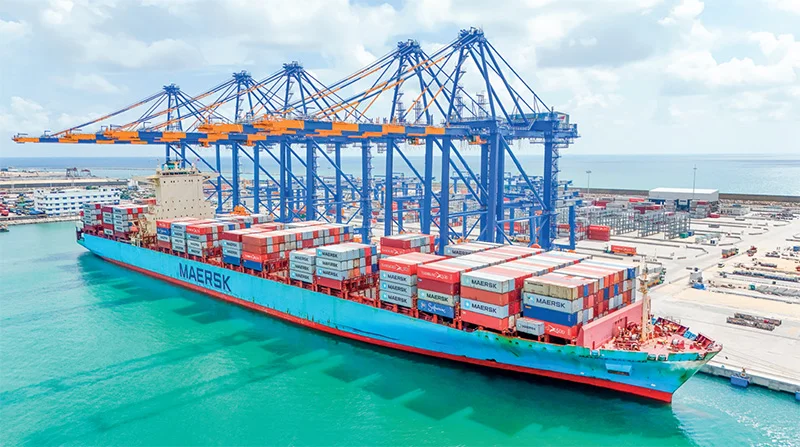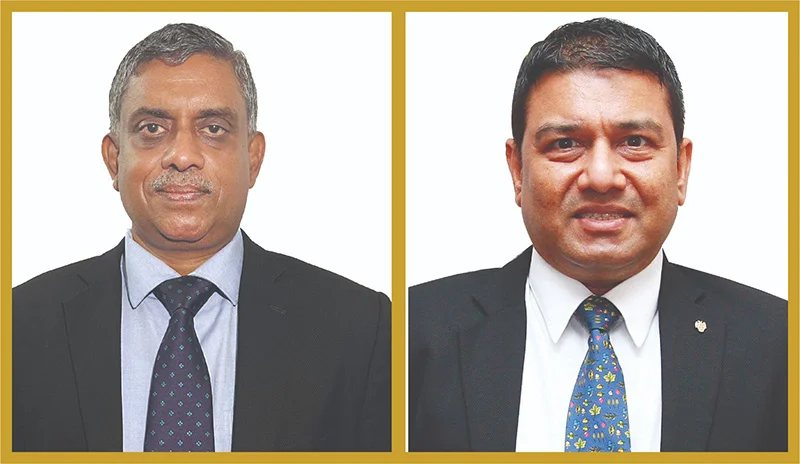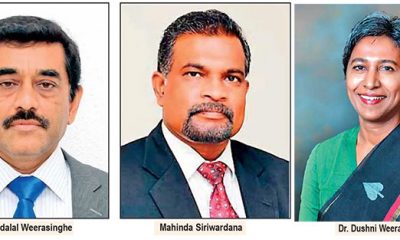News
Economic crisis: Treasury Chief frowns on home-grown remedy tried by GR regime

Secretary to the Treasury and Finance Ministry Mahinda Siriwardana has said that even if Sri Lanka achieves the goal of zero corruption, tax revenue will still have to be increased to bridge the budget deficit and lessen the country’s debt burden.
Referring to the Supreme Court ruling pertaining to economic management delivered on Nov 14, 2023, Siriwardena said it was imperative that elected representatives and state officials ensure proper econmic management.
Pointing out that Sri Lanka’s government revenue as a percentage of GDP had been as low as 8.3 percent in 2021, Siriwardana said that the situation was so bad that the government found it difficult to meet day-to-day expenses.
The SC judgment had said the state officials under any circumstances couldn’t absolve themselves of the responsibility for acting in the best interests of the public and were entrusted with significant powers to uphold public trust, requiring them to adhere to the directives of the Constitution, Siriwardana said.
The Treasury Secretary said so delivering the inaugural Prof. K. Dharmasena memorial lecture at the Kelaniya University on Monday (Jan 30) close on the heels of undergraduates storming the main administrative building there to protest against a planned visit by President Ranil Wickremesinghe the following day.
Siriwardana succeeded S.R Attygalle in early April 2022 amidst the worst-ever economic crisis.
The Treasury Secretary explained why President Gotabaya Rajapaksa’s government had failed to secure a Rapid Financing Instrument (RFI) at the early staes of the crisis.
Although President Gotabaya Rajapaksa sought RFI from the International Monetary Fund (IMF) in April 2020, five months after being elected, his administration failed to accept the IMF prescribed immediate debt restructuring. Instead of adopting a strategy of macroeconomic reforms to restore fiscal and external buffers supported by the IMF, the government had opted for what Siriwardana called a home-grown solution.’
Sri Lanka sought RFI in the wake of significant tax reforms with sharp reductions in VAT (Value-Added Tax) and income tax rates and large increases in tax free thresholds. “When taxes were reduced at the end of 2019, nobody questioned how public services would be funded. The result was an unprecedented escalation in debt, leading to this economic crisis.
Siriwardana pointed out that for want of cohesive corrective measures to address the issues at hand, credit ratings continued to deteriorate. By September 2020, Moody’s had downgraded Sri Lanka to Caa1, Fitch downgraded Sri Lanka to CCC by November 2020, and S&P downgraded Sri Lanka to CCC by December 2020, Siriwardana pointed out.
“There have been long-standing structural weaknesses in the Sri Lankan economy which have been neglected for many decades, given the pain associated with remedying these issues. The weaknesses include fiscal sector imbalances, inadequate external policy buffers, financial and monetary sector vulnerabilities, deficiencies in governance, and shortcomings in the legal and institutional framework in the country. The recent external shocks faced by the country, including the Easter Sunday attacks, the COVID-19 pandemic, the Russia-Ukraine conflict, coupled with significant domestic policy errors, exposed these macroeconomic vulnerabilities and triggered the prevailing economic crisis.”
In macroeconomic terms, the crux of the problem has always been the persistent twin deficits – budget deficits in the fiscal account and current account deficits in the balance of payments (BOP) accounts, Siriwardana added.
The Treasury Secretary said that the country should have changed its unsustainable practices, beginning 2006/2007, when the opportunity to access concessional foreign financing diminished in the wake of Sri Lanka’s per capita GDP crossed the middle income threshold. Instead of gradually and significantly reducing its deficits and borrowing requirements, the then government shifted to commercial borrowings, primarily in the form of international sovereign bonds (ISBs). “Most of these bonds have up to a 10-year maturity periods, so, until around 2019, Sri Lanka did not face much difficulty in terms of repayment pressures for external debt.”
Siriwardana also discussed the often raised issue of whether ISBs caused the debt crisis. In fact, the government at the time made a conscious decision to raise additional funds amounting to USD 2.4 billion in long term ISBs to ensure Sri Lanka would have sufficient reserve buffers to get through a period of volatility amidst the election cycles of 2019 and 2020, Siriwwardana said. ” There have been claims that this increase in ISB borrowings was a cause of the debt crisis – however in reality, it was the additional reserve buffers created by those ISBs that enabled the government to avoid a crash in the economy during the worst of the COVID-19 pandemic.
“The government maintained primary surpluses in 2017 and 2018, indicating that the ISB borrowings were not driven by budget deficits, but in order to build up reserves and to improve the quality of reserves by converting maturing short term debt into longer term stable instruments such as ISBs and syndicated loans. The fundamental drivers of the economic crisis were fiscal and debt unsustainability, whereas ISBs were just one of many financing instruments.”
Siriwardana said: “There have been various theories as to what caused the economic crisis, including the COVID-19 pandemic, ISB borrowings, the Debt Standstill policy. However, it is clear that the fundamental cause has been long standing macroeconomic vulnerabilities and domestic policy errors. There have also been various alternative proposals and theories as to how the country can recover without the citizens having to bear a burden. But, we have seen today that measures such as asset recovery, collection of taxes in arrears, elimination of corruption, while all being essential actions, do not serve as an alternative to the macroeconomic reforms being implemented today. Those are reforms that were known to all of us for years if not decades. But, those much needed reforms were delayed mainly due to political reasons. In the past, and up to now, the present generation lived a better life by borrowing thereby sacrificing the lives of the future generations.
“However, it is critical to understand that now we have come to a situation where the present generation should make sacrifices for the betterment of the lives of the future generations.” (SF)
News
Breakaway JVP faction decries Indo-Lanka MoUs as betrayal

… alleges Kanchana’s Electricity Act exploited to facilitate ‘deal’ with India
The Frontline Socialist Party (FSP) has alleged that President Anura Kumara Dissanayake entered into seven MoUs/Agreements with India without consulting Parliament or the Cabinet of Ministers.
Accusing President Anura Kumara Dissanayake, who is the leader of the Janatha Vimukthi Peramuna (JVP), as well as the National People’s Power (NPP), of undermining Sri Lanka’s sovereignty, the breakaway JVP faction pointed out the signing of seven MoUs/Agreements had coincided with the 54th anniversary of the JVP’s first insurrection.
The top FSP spokesman and their Education Secretary, Pubudu Jayagoda, told a press conference, at their Nugegoda party office, that the JVP had completely betrayed those who sacrificed their lives during the 1971 and 1987-1990 insurrections. Having completely changed its policy towards India, the JVP was now down on its knees before India, Jayagoda said.
The dissident JVPer emphasised that such vital MoUs/Agreements couldn’t be finalised without proper consultations. Declaring that the MoUs/Agreements hadn’t been released yet, Jayagoda said that the FSP, in terms of the Right to Information Act, sought the copies of them as the public couldn’t be deprived of their right to know.
The section, now calling themselves FSP, split from the JVP in early 2012 after major differences among the top leadership over the direction of the party. Anura Kumara Dissanayake succeeded Somawansa Amarasinghe as the JVP leader in Dec. 2014.
Referring to the MoU, in respect of the implementation of HVDC interconnection for import/export of power, Jayagoda said that the NPP took advantage of the new Electricity Act that was enforced by the Wickremesinghe-Rajapaksa government in late June last year to pave the way for a deal with India. The JVP-led NPP that moved court against the then Power Minister Kanchana Wijesekera’s Bill, and voted against the Bill at the second reading, exploited the same to its advantage, Jayagoda charged.
The Sri Lanka Electricity Bill repealed the 1969 Ceylon Electricity Board (CEB) Act and subsequent laws regarding the electricity industry.
Comparing the MoU, signed in the presence of President Dissanayake and Premier Narendra Modi, Jayagoda said that both Nepal and Bangladesh had been trapped in similar agreements they signed earlier.
Jayagoda alleged that Nepal was in such a pathetic situation even if they could meet electricity requirement through hydro-power generation, the agreement with India compelled them to obtain power from India.
Jayagoda pointed out that the government now boasted of a proposed new120 MW solar power plant at Sampur to be implemented in two stages after having crippled domestic solar power generation capacity. The former JVPer said that the NPP government was bending backwards to appease India and pursuing an agenda inimical to Sri Lanka.
Jayagoda dealt with the MoU on cooperation in the field of sharing successful digital solutions implemented at population scale for digital transformation. The FSP spokesman said that the Indian-funded project to issue digital NIC would be disastrous as it would enable India to gather information.
Commenting on a MoU that covered the health sector, Jayagoda alleged that the government had agreed to share authority exercised by the National Medicine Regulatory Authority (NMRA) with India.
Jayagoda said that the MoU on defence cooperation undermined the country’s vital security interests and jeopardised relations with other countries.
The FSP said that political parties, represented in Parliament, were largely silent and seemed to be reluctant at least to express their views on the betrayal of the country.
By Shamindra Ferdinando
News
Adani’s Colombo Terminal commences operations

Adani Ports and Special Economic Zone Ltd. (APSEZ), India’s largest integrated transport utility, has announced the commencement of operations at the Colombo West International Terminal (CWIT), located at the Port of Colombo, the company said in a statement issued simultaneously in Ahmedabad and Colombo yesterday (07)
Developed under a landmark public–private partnership, CWIT is operated by a consortium comprising India’s largest port operator Adani Ports & SEZ Ltd., leading Sri Lankan conglomerate John Keells Holdings PLC, and the Sri Lanka Ports Authority, under a 35-year Build, Operate, and Transfer (BOT) agreement.
The CWIT project represents a significant investment of USD 800 million and features a 1,400-metre long quay and 20-metre depth, enabling the terminal to handle approximately 3.2 million Twenty-foot Equivalent Units (TEUs) annually. It is the first deep-water terminal in Colombo to be fully automated, designed to enhance cargo handling capabilities, improve vessel turnaround times and elevate the port’s status as a key transshipment hub in South Asia.
Construction began in early 2022 and has since achieved rapid progress. With the installation of cutting-edge infrastructure now nearing completion, CWIT is poised to set new benchmarks in operational efficiency and reliability in regional maritime logistics.
“The commencement of operations at CWIT marks a momentous milestone in regional cooperation between India and Sri Lanka,” said Chairman of the Adani Group Gautam Adani. “Not only does this terminal represent the future of trade in the Indian Ocean but its opening is also a proud moment for Sri Lanka, placing it firmly on the global maritime map. The CWIT project will create thousands of direct and indirect jobs locally and unlock immense economic value for the island nation. It also stands as a shining example of the deep-rooted friendship and growing strategic ties between the two neighbours, and of what can be achieved through visionary public–private partnerships. Delivering this world-class facility in record time also reflects the Adani Group’s proven ability to efficiently execute large-scale critical infrastructure projects anywhere in the world.”
“We are proud to see the progress in the development of the West Container Terminal, a project that strengthens Sri Lanka’s position as a regional maritime hub,” said Chairperson, John Keells Group Krishan Balendra. “This project is one of the John Keells Group’s largest investments and is among the most significant private-sector investments in Sri Lanka. Together with the Sri Lanka Ports Authority and the Adani Group, we will elevate Colombo’s status as a leading transshipment hub. We are confident that the project will enhance global trade and connectivity in the region”, he said.
News
SLIC Life reports robust performance with Rs. 30.7 Billion PBT in 2024

Sri Lanka Insurance Corporation Life Limited (SLICLL) has concluded the year 2024 with outstanding financial performance, achieving a remarkable profit before taxation of Rs. 30.7 billion. The text of SLIC statement: “The company recorded a robust Gross Written Premium (GWP) of Rs. 26.3 billion, reflecting an impressive 25% growth. Remarkably, as of December 31, 2024, Sri Lanka Insurance Life marked a historic milestone with a New Business volume of Rs. 5.3 billion, recording a 48% growth, the highest in the company’s history.
Demonstrating its unwavering commitment to policyholders, Sri Lanka Insurance Life disbursed Rs. 13.7 billion in maturity settlements and claim payments in 2024, these figures reaffirm the company’s financial strength and dedication to fulfilling its obligations. Further cementing its position as a market leader, SLICLL continued to expand its asset base to an impressive Rs. 237 billion and grew its Life Fund to Rs. 213.2 billion. These achievements were realised amidst organizational transformations and challenging economic conditions. Additionally, the company recorded 319 MDRT qualifiers, the highest ever for SLIC Life.
Highlighting its prudent investment strategies and unwavering commitment to policyholders, Sri Lanka Insurance Life declared the largest Life Insurance bonus in the industry for 2023, amounting to Rs. 11.2 billion. Over the past two decades, the company has consistently delivered industry-leading bonus payouts, with cumulative declarations exceeding Rs. 104 billion. Continuing this legacy, Sri Lanka Insurance Life is set to declare its highest ever bonus for 2024, with official communication to be released in the near future.
Group Chief Executive Officer of Sri Lanka Insurance, Mr. Chandana L. Aluthgama, stated, “Our exceptional financial performance is a testament to the dedication and resilience of our team, who have navigated challenges with unwavering commitment. Despite economic fluctuations and internal transformations, our strategic focus has reinforced our market leadership. As we step into the future, we remain committed to innovation, customer trust, and industry leadership.”
Chairman of Sri Lanka Insurance, Mr. Nusith Kumaratunga, emphasized, “Sri Lanka Insurance Life has proven its strength and stability, delivering sustainable growth while reinforcing its role in the nation’s economic progress. Our vision extends beyond business success, we aim to contribute to national development by strengthening the economy and reducing dependency of the people on state support.”
Beyond financial success, Sri Lanka Insurance Life continued to earn industry recognition in 2024. The company was named ‘The Most Loved Life Insurance Brand’ by LMD for the seventh consecutive year and was ranked among the ‘Top 100 Most Valuable Brands’ in Sri Lanka by LMD Brand Finance. Additionally, SLIC Life secured top honors at the ‘Best Management Practices Company Awards 2024,’ ranking among the top ten companies and winning the ‘Insurance – Public Sector Company’ category.
Committed to international standards and operational excellence, Sri Lanka Insurance Life maintains ISO 9001:2015, ISO/IEC 27001:2013, and ISO 14064-1:2018 certifications. The company also continues its social impact initiatives, including the free Life Insurance cover gifted to parents of newborns on World Children’s Day for the third consecutive year, supported 1100 families in flood affected areas, providing emergency assistance to pilgrims traveling to Anuradhapura for Poson Poya and the awarding of 370 Suba Pathum scholarships to outstanding students in national examinations.
Looking ahead, Sri Lanka Insurance Life remains focused on driving innovation, enhancing customer confidence, and making meaningful contributions to society. With a solid foundation and a clear vision, the company is poised to maintain its legacy of excellence and leadership in the insurance industry.
.
-

 Business1 day ago
Business1 day agoColombo Coffee wins coveted management awards
-

 Features2 days ago
Features2 days agoStarlink in the Global South
-

 Business3 days ago
Business3 days agoDaraz Sri Lanka ushers in the New Year with 4.4 Avurudu Wasi Pro Max – Sri Lanka’s biggest online Avurudu sale
-

 Business4 days ago
Business4 days agoStrengthening SDG integration into provincial planning and development process
-

 Business3 days ago
Business3 days agoNew SL Sovereign Bonds win foreign investor confidence
-

 Sports5 days ago
Sports5 days agoTo play or not to play is Richmond’s decision
-

 Features2 days ago
Features2 days agoModi’s Sri Lanka Sojourn
-

 Sports4 days ago
Sports4 days agoNew Zealand under 85kg rugby team set for historic tour of Sri Lanka

















